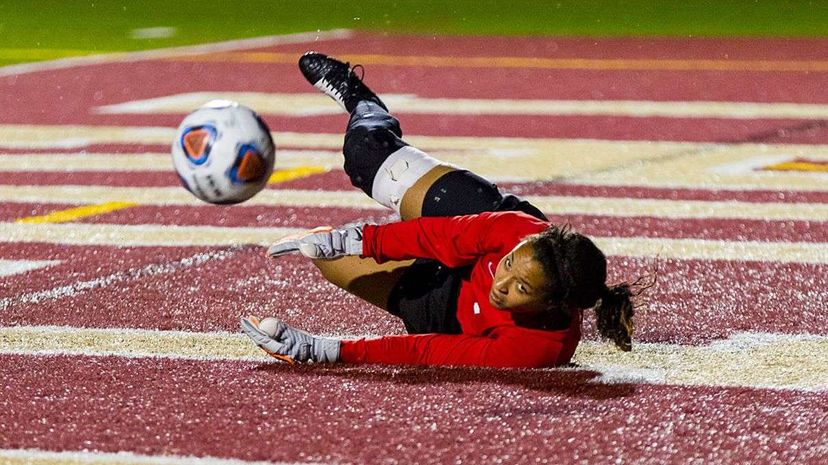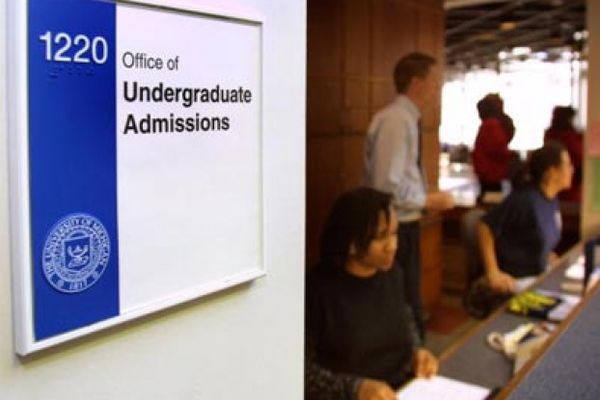
At a time when college sports are under fire for exploiting the “free” labor of student-athletes for lucrative TV contracts, and failing to protect students from life-altering concussions, the NCAA is desperate for a last-second buzzer-beater of good news to save the reputation of college sports.
Swish! According to a landmark Gallup survey commissioned by Purdue University, former college athletes are not only more successful in the workplace, but also more satisfied and engaged in everyday life.
Advertisement
It's long been established that former college athletes graduate with a unique set of skills that makes them attractive to corporate recruiters, especially in the high-stakes world of finance.
“Resiliency, grit, stick-to-itiveness, teamwork, communication skills — in particular the ability to receive feedback constructively — those attributes come through at really high levels with student-athletes,” says Vin McCaffrey, founder and CEO of Game Theory Group, a software company that helps student athletes transition successfully to life after college sports.
How Former College Athlete Fare Better
The Gallup survey adds a new chapter to the story, pointing to something unique about the student-athlete experience that results in greater-than-average well-being and life satisfaction. The survey, which polled 1,670 former NCAA athletes and 22,813 non-student-athletes who graduated between 1970 and 2014, found that the former athletes rated themselves significantly higher on four out of five measures of personal well-being:
Purpose well-being (liking what you do each day):
· former student athletes: 56 percent
· non-student-athletes: 48 percent
Social well-being (having strong relationships and love):
· former student athletes: 54 percent
· non-student-athletes: 45 percent
Community well-being (pride in your community):
· former student athletes: 51 percent
· non-student-athletes: 43 percent
Physical well-being (having good health):
· former student athletes: 41 percent
· non-student-athletes: 33 percent
McCaffrey, who played Division I college basketball for Lehigh University, isn't surprised by Gallup's findings. He says that the rigors of the student-athlete experience are transformative.
“The demands on a student-athlete today are far more significant than what we've ever seen,” McCaffrey says, referring to the ever-present camera phone and social media that document every faux pas you could make. “As you pass through that experience, I think steel sharpens steels, and these athletes come out the other side with these outcomes that Gallup referred to.”
Surprisingly, given the strong connection between athletic and corporate success, the only area that was an effective tie between athletes and non-athletes was financial well-being.
Financial well-being (effectively managing your economic life):
· former student athletes: 38 percent
· non-student-athletes: 37 percent
More than 460,000 student-athletes compete for U.S. colleges and universities in 24 men's and women's sports, according to the NCAA. Why are they more likely to have a strong sense of purpose and engagement in their lives? Because they learned early on to set concrete goals and understand the pain and sacrifice required to achieve them. Why do they have stronger connections to community? Because they've been trained to be ambassadors for their schools and their cities.
Former Football and Basketball Players Not Thriving
It shouldn't surprise anyone that former student-athletes are healthier and fitter than the general population, given the thousands of hours spent in the gym. But what's most surprising — shocking, even — about the Gallup results is how poorly former football players and men's basketball players rate their physical well-being.
In the Gallup survey, only 28 percent of former student-athletes in these two marquee men's sports — the sports that earn the most revenue for schools — rated themselves as “thriving” physically. That's compared with 47 percent of athletes who played other sports. In the Wall Street Journal, a professor or nutrition and exercise physiology blamed the health disparity on the pounding physical nature of football and basketball.
In a 2011 study, Pam Hinton of the University of Missouri found that former Division I football players reported “more late life cognitive difficulties and worse physical and mental health than former non-collision sport athletes and non-athletes.”
As much as he believes in the overall positive effects of playing collegiate sports, McCaffrey is quick to add some caveats to the rosy picture painted by the Gallup survey.
“Gallup is looking at athletes versus the general population, as they should. But you also need to convey where the [wellbeing of the] general population is. Right now, it's not so high,” McCaffrey says.
Advertisement

